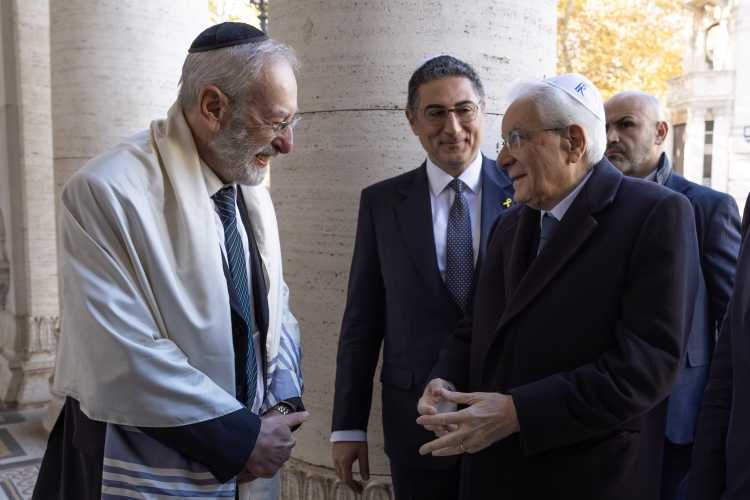ROME – Italian President Mattarella celebrates Great Synagogue’s 120th birthday

After centuries of confinement in the ghetto, the granting of civil rights and freedoms offered Roman Jews the opportunity to build a grand synagogue in that very area, serving as a symbol of their historic shift toward emancipation. The synagogue was intended to “proudly rise among the constructions of the new city” and embody a “monumental and austere character,” according to the competition guidelines for its construction. These criteria were fulfilled by the Tempio Maggiore, which on December 5, celebrated its 120th anniversary in the presence of, among others, Italian President Sergio Mattarella, Senate President Ignazio La Russa and UCEI President Noemi Di Segni. President Mattarella’s entry into the synagogue was accompanied by the singing of children, with additional musical performances marking the importance of his visit.
“Resist, hope, and build”
“This is not the first time President Mattarella has demonstrated his solidarity with us,” remarked Victor Fadlun, president of the Roman Jewish Community. He recalled Mattarella’s presence at the Tempio Maggiore on the 40th anniversary of the 1982 attack by a Palestinian commando, which claimed the life of young Stefano Gaj Taché. Fadlun emphasized the President’s consistent support, beginning with his inaugural speech in February 2015, when he condemned “the cost of hatred and intolerance” and singled out one name—Stefano Gaj Taché, whom he described as “our child, an Italian child.”
The Tempio Maggiore, Fadlun noted, “is a symbol of the emancipation of Roman Jews and the reclamation of our rights and responsibilities as citizens.” It is the place where the community has gathered “to reaffirm our will to exist and resist—our resilience during the racial laws, Nazi-Fascist persecution, and occupation.”
Now as in the past, he added, the Great Synagogue remains a gathering place “whenever Israel has been attacked and compelled to defend itself against those who have sought to erase it from the map, along with the Jewish people.” “This is where we express our love for life,” Fadlun concluded.
Chief Rabbi Riccardo Di Segni highlighted how “the small yet significant history of our Community and the Temple that represents it can offer a positive contribution” in confronting “other forms of bloody turmoil” that today echo the challenges of the past. This history, he emphasized, serves as “a warning against violent extremism, expulsions, marginalization, and the deprivation of rights.”
It also provides a lesson, Rabbi Di Segni stressed, through the example of a community that has “remained faithful to its traditions while integrating virtuously, becoming a source of enrichment for Rome and Italy.” He reiterated the three key verbs central to the community’s resilience: resist, hope, and build.
“The story of this building and its community demonstrates that we can succeed—that there are no limits to divine mercy, but we have a duty to act righteously,” Rabbi Di Segni stated, referencing the Bible. He specifically cited Genesis 6:11-13, where it is written, “The earth was corrupt and filled with violence.” The rabbi drew attention to the chilling resonance of the Hebrew word for violence, hamàs, which he noted is the same as the name of the militant group.
He concluded by emphasizing that “the survival of our society” depends on peaceful coexistence among citizens who “respect the laws and share the duty of building a better world together.” This, he underlined, is “an obligation of everyday life.”
Messages from Israel’s Chief Rabbis
The ceremony included video messages from Israel’s Chief Ashkenazi Rabbi Kalman Bar and Chief Sephardi Rabbi David Yosef. Rav Bar acknowledged the hardships faced by Roman Jews, stating, “There were times in Rome when survival was nearly impossible.” Yet, he affirmed, the Great Synagogue remains “a symbol and an example of the people of Israel who live and endure.” Rav Yosef offered his blessings to the community: “May divine blessing accompany every work of your hands. May you continue to guide Roman Jewry with pride and, with God’s help, bring the hearts of the people of Israel closer to our Father in Heaven, uniting the hearts of Israel and the nations of the world.”
